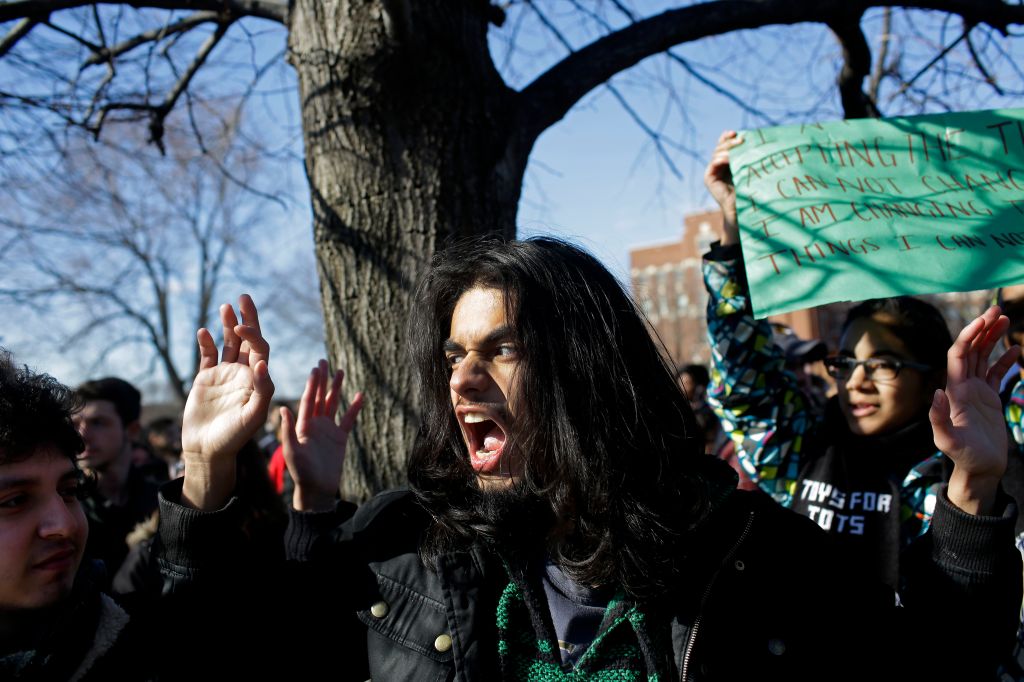
Source: JOSHUA LOTT / Getty
After the Women’s March in 2017, we sat riveted at the participation and patronage of it all. We became enamored with the protests—their scope and their tenacity—as not just an act of courage, but a celebration of the protesting itself. We grew more enchanted with ourselves—we, the protesters—as stories rolled in with attendance counts. We celebrated dead-on takes on the nation’s mood of the moment on cardboard placards. Then the inevitable posts asking us to, “Check out the best signs!” started. We couldn’t be everywhere at once, after all, and people are witty and smart and pithy in the face of unreal evil. We’ve already begun to do the same regarding the March For Our Lives protests this weekend where participants advocated for stricter gun control laws. But we really need to chill. Unless we’d like to fall prey to the “very definite thrill of virtue” that James Baldwin warned us about.
In seemingly terrible times, pith can be a revolutionary act. That’s why we used to watch Jon Stewart do his thing. The comedian became liberal America’s arbiter of the absurd. He poked holes in the self-serious dictums of the other side. It was comedy as psychoanalysis, a therapeutic piece de resistance against the bogus, obvious racism and apologia masquerading as thought all over Fox News. Stewart did this even while inadvertently modernizing the language of “fake news.” He did it as would Mark Twain, as a kind of riff on the emperors of morality on the right that seemed to have no clothes. Except they weren’t riffing.
What Donald Trump’s election has made clear is that while the liberal community used humor as a healing balm to insulate themselves, conservatives have acquired power. The Federalist Society, journalists found, has been filling lower courts with conservative judges for near 30 years, arguing for a more radical approach to shaping society. And the Koch brothers have been backing ultra-libertarian conservative candidates all over the country, pouring hundreds of millions of dollars into reshaping small elections in red and blue states nationwide.
As this went on and the catalyst of an Obama election gathered inertia, forces that had been working for decades began to acquire outsized visibility. Suddenly, we know their names. The Mercers: wealthy backers of Breitbart, the rag that ushered Trump into power. The Sinclair Broadcast Group: a pro-Trump media conglomerate that recently dropped $3.9 billion on the Tribune network of stations, bringing its mix of conservative commentary and local news to 72 percent of the nation’s local news television marketplace.
So when you’re sitting in your living room wondering how your world has become blanketed by abhorrent ideologies and school shootings (Nikolas Cruz was seen wearing a “Make America Great Again” hat on his Instagram along with a dead lizard and bullets), you have to know that while protesting is effective, mock celebrations of it as an event are not. Mostly because people had to be murdered to ignite the kind of fervor needed to have the protest. And, in this case, those people were children.
I’d argue that protesting is not an “event.” It is an outpouring of furious emotion. It is a living polemic, a fixture of the American landscape ensconced in the constitution as a right. It helped save Black people from the hell of Jim Crow; it has helped save countless people from other American hells; it has tried to save America from herself, from the mind-numbing violence and bigotry of her own history. It is the weight you feel when you slide into bed with Uncle Sam. It says that processes you think are egregious can have redress. That your representatives and institutions, whatever their personal associations and afflictions, can be made to hear your cries through consensus. It is an act of power. Its celebration is not.
While protesting is effective, mock celebrations of it as an event are not. Mostly because people had to be murdered to ignite the kind of fervor needed to have the protest. And, in this case, those people were children.
This joviality is the discharge of heat from a moving object. It is sentimentality. It’s what Baldwin called, “the ostentatious parading of excessive and spurious emotion.” What he continued to name as the “mark of dishonesty.” Because it is fundamentally dishonest to assume that these protests encapsulate us all, even as we root for these children. Even as we make these protests and these children the furrow by which we finally achieve a reasonable path toward serious conversation around gun control. Yes, kids have changed society before. Yes, the social contract that says we should be protecting the young in this world makes us listen up. But they are not invincible. They are not our conscience. Merely protesting is not the work itself. Let us not confuse one with the other.
The kids know this. All over the news, they have said they will not stop talking. That they will continue for as long as it takes to make the Parkland school shooting the last. They won’t make that come true (there have already been school shootings since Parkland), but they can look to the larger goal: making America more moderate on guns would be a major win for sanity.
The media scrutiny around this subject will soon shift, overshadowed by some other scandal, by some other emergency. The world can be hard to look at now that we seem to know and have no idea what knowing is doing to us. And while the signs are fun, cathartic coping mechanisms for acts that have shaken us to our cores, we should not be celebrating them in this way. To do so would be to assume that protest is a thing that will make everything okay automagically. It will not. It cannot. It is only part one. Let us wait until laws are changed so we can make posts saying, “Check out the best signs from the signing of x gun control law!”
















